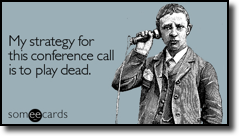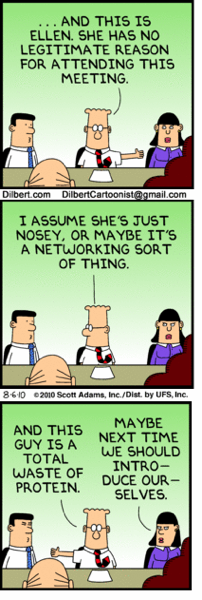 Next to Windows Solitaire, I am pretty sure the telephone is responsible for more time wasted at work than any other invention. How else can you explain the number of times we finish a conference call and make that, “well that was a total waste of my time” look?
Next to Windows Solitaire, I am pretty sure the telephone is responsible for more time wasted at work than any other invention. How else can you explain the number of times we finish a conference call and make that, “well that was a total waste of my time” look?
In all fairness, meetings in general, if not executed well, have a history of wasting time. I am sure that when Ogg called his cavemen friends together to discuss how to best kill a wild beast, that there were some in the cave playing hangman on their stone tablets wondering when this meeting would end.
Many years ago I had a weekly team meeting that at first was quite productive. Then as our team size quadrupled, it became quickly ineffective. Fifteen minutes into one of those meetings, Tim, one of our more brash engineers, wrote the number $225 in large numbers on the whiteboard. After another 15 minutes he wrote $550, adding another $225 every quarter hour until we finished. When curiosity finally got the best of me, I asked what he was doing. “Based on the number of people in the room and a rough guess of the median salary,” he responded, “I’ve calculated how much money this meeting has cost us.” Then Tim asked the kicker, “Do you think what we discussed here was worth $1,125?”
A valid question.
The advent of the phone, though, seems to have multiplied the potential to waste time to an all new level. Somehow, the anonymity  created by not seeing faces has caused meeting sizes to jump dramatically. Like money, we tend to value the dollar bill in our hand more than the virtual one on our charge card. There’s also no longer the constraints on the meeting size caused by a physical conference room . Everyone can participate in the phone party! To make matters worse, people are more readily accepting conference call invitations because they know they can still do work in the background.
created by not seeing faces has caused meeting sizes to jump dramatically. Like money, we tend to value the dollar bill in our hand more than the virtual one on our charge card. There’s also no longer the constraints on the meeting size caused by a physical conference room . Everyone can participate in the phone party! To make matters worse, people are more readily accepting conference call invitations because they know they can still do work in the background.
And it is getting worse every day.
I appeal to those who are arranging these calls to reverse this trend. I offer two suggestions on how to do accomplish this.
First, for every individual invited, know why they are there and tell them – not as a group, but as an individual contribtor. Imagine that when each person connects to the call they must say, “Hey, this is [insert name here]. Why am I here?” You then must respond with an answer that specifically tells them what their role is and why they were chosen. If you haven’t provided a good enough reason, they get the option of hanging up.
“Hi, who just joined?”
“This is Ogg. Why am I here?”
“Hi Ogg. We are going to be discussing the best way to slay a buffalo today and, as a part of the OSHA compliance group, I need your expertise on how to do this safely.”
“Great. Thanks.”
Ogg now knows his role, and he is engaged to actively participate. He knows that he is being counted on to represent a required role and he will feel less likely to multitask. More importantly, you have gone through the exercise of proving to yourself that each individual was necessary.
 While it would be rather laborious to actually do this inventory on the phone, not to mention embarrassing if someone did hang up after telling them their role, consider doing it in the meeting invitation. For each person invited, write down why they were invited in the notes section. That way they can decide if they are the right person to attend or if they should attend at all. It’s a good conversation to have before a meeting starts.
While it would be rather laborious to actually do this inventory on the phone, not to mention embarrassing if someone did hang up after telling them their role, consider doing it in the meeting invitation. For each person invited, write down why they were invited in the notes section. That way they can decide if they are the right person to attend or if they should attend at all. It’s a good conversation to have before a meeting starts.
Second, always start your meeting by stating the following: “At the end of this meeting, we will have been successful if we [fill in the blank].” This statement assures you that everyone knows the meeting purpose, knows that it is possible to be successful, and gives you the freedom to corral conversation that doesn’t get you closer to your goal.
I usually follow up with an incentive: “If we can accomplish that goal before the end of the meeting, we will end early.” Ending early is like a parfait. In the words of the immortal philosopher Donkey, “Who doesn’t like parfait?”
That’s it – it is that easy. I think you will be surprised at how simply telling each individual why they are there and then beginning a meeting declaring what success looks like will radically alter the effectiveness of your conference calls. You’ll get smaller, more effective meetings and people will respect you for respecting their time and talent.






